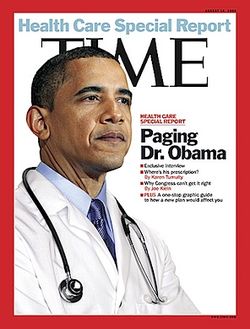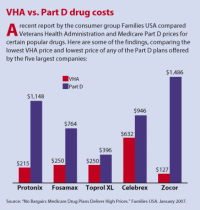
There is no such thing as health insurance.
There is care. There is non-care.
But insurance is a bet against odds. You bet with the car insurance company you’ll get into an accident. You bet with the life insurance company you’ll die.
This is not true with “health insurance.” The need for care is a certainty. The need varies by age, by circumstance, and by chance. But everyone needs regular, preventive medical care. Nearly everyone needs some type of medication to deal with mild symptoms like headache and stomach upset. Nearly every woman of child-bearing years needs birth control. Nearly every kid falls or gets sick more than once a year.

The biggest part of our national health care budget comes in dealing with these chronic conditions preventive care is meant to forestall. Diabetes is a chronic condition. Heart disease is a chronic condition. If you monitor chronic conditions carefully, if you fight them actively, you keep people out of the hospital, people of any age.

The great failure of liberal politicians over the last 25 years has been to frame this as a “health insurance” debate when it has always been about care. Even the market agrees. The “Obamacare policies” that won in the exchanges have been managed care plans. Managed care companies like Centene or Kaiser get a set amount of money per-patient, and if they keep their patients around under this budget they profit. This is how Medicare and Medicaid work. Medicaid and Medicare operate at a much lower per-patient cost than ordinary insurance, even though they are dealing with greater risks, with old people and poor people who are more likely to have accidents or contract expensive diseases.

There is a simple way to save hundreds of billions of dollars, maybe trillions of dollars, without changing our current system. Simply let Medicare, and private insurers, bargain on drug costs, drug formularies, and medical devices. Stop allowing ads aimed at patients who don’t know Otezla from Humira. The reason there were “Obamacare horror stories” this decade was because drug companies bought up generic production, raised prices to the skies, and pocketed the profits – sometimes in other countries. Your EpiPen didn’t become prohibitively expensive because the cost of making ephedrine rose. It became expensive because Mylan raised the price. They could get away with it because no one could bargain against them on that price. End monopolies, eliminate advertising, allow bargaining, and costs plummet.

There’s another thing that can cut costs dramatically. Health IT. Despite $19.2 billion in “sweet, sweet stimulus cash” as I called it, doctors and hospitals still don’t use technology effectively. Every doctor’s office still has a little bureaucracy in front of it, clerks who are involved in appointments, or billing functions that every other industry automated long ago. We tried the carrot. Time to get out the stick. If you’re not automating, you’re not getting paid.
The costs of care, in other words, can be cut dramatically. But we need to stop talking about “insurance,” simply because a huge industry developed, starting during World War II, to cover health as an employee benefit. This system became unaffordable a generation ago, yet still it continues, because policymakers still talk about “health insurance.”

This complexity of contract languages can hit anyone, even someone with the “good insurance,” which we have. My wife is constantly getting bills from hospitals or clinics that didn’t go through her insurer before sending the bill, or that are billing for care they were already paid for. Thank got she is detail-oriented and a little OCD. ADD people like me are driven crazy by this crap.

It’s insane. And it’s time we talked honestly about it, because people are going bankrupt, even in Trumpistan. People are dying in droves in Trumpistan, and it’s going to get worse. People are dying everywhere, but Trumpistanis are more likely than people in TechLand to suffer chronic conditions or to have problems with addiction.
You want to blame Democrats when grandma gets kicked out of the nursing home next year? Good luck, but she’s still going to be sitting in front of your TV watching her “stories” instead of letting you see the sports.










Finally somebody agrees with me!
My own formulation of the crucial point is “Most cars don’t get totaled in accidents, and most houses don’t burn down: it’s for the exceptions that we buy insurance. But everybody gets sick eventually, and most people die under a doctor’s care: for this what we need is not insurance, just a predictable and affordable way of paying for what will certainly happen.”
Finally somebody agrees with me!
My own formulation of the crucial point is “Most cars don’t get totaled in accidents, and most houses don’t burn down: it’s for the exceptions that we buy insurance. But everybody gets sick eventually, and most people die under a doctor’s care: for this what we need is not insurance, just a predictable and affordable way of paying for what will certainly happen.”